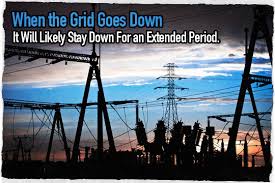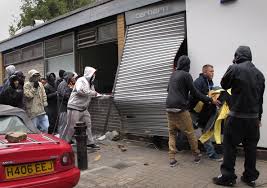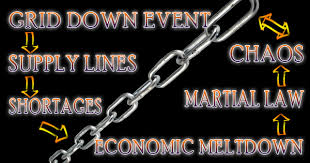$934 Billion Needed to Fix US Electric Grid
 Americans have become now people, committed to short-term thinking and lifestyles, content with current comforts and routines. Most allow a few liberal media to tell them what opinions they should have. Living in a welfare state never felt better.
Americans have become now people, committed to short-term thinking and lifestyles, content with current comforts and routines. Most allow a few liberal media to tell them what opinions they should have. Living in a welfare state never felt better.
But the latest issue of Time magazine warns that the US infrastructure is being perilously sidestepped: “today’s vital need is routine upkeep, which is easy to ignore—until something goes wrong.” Why? America is becoming a poor and debtor nation, though few admit it: “That’s why cash-strapped cities and states are struggling to maintain the bridges, tunnels and roads that citizens count on. Federal funds are shrinking too. Take the Highway Trust Fund. It routinely runs dry because its primary funding—a tax on gasoline—hasn’t kept up with inflation since 1994.” Local wheel taxes are a stopgap at best.
 The article sets repairs needed for basic infrastructure upgrades in the next two decades: levees ($100B), airports ($32B), drinking water ($384B), highways ($170B), bridges ($106B), rail ($10B), and solid waste ($56B). The most alarming, however, is the electric grid at $934B, more than all the others combined. And it’s fragile.
The article sets repairs needed for basic infrastructure upgrades in the next two decades: levees ($100B), airports ($32B), drinking water ($384B), highways ($170B), bridges ($106B), rail ($10B), and solid waste ($56B). The most alarming, however, is the electric grid at $934B, more than all the others combined. And it’s fragile.
Even while the grid is optimizing itself through smart technologies, it “is still vulnerable to physical and cyber attacks.” Sadly, a “security advisory firm found that half of the 1,000 utility substations it inspected last year were secured by only a padlock.”
Preppers and survivalists are going mainstream, as my recent “After the Fall, Beyond Prepper Gardening” reports. Propane-based whole-house generators are being installed in homes on the outskirts of town. So are 2,500 gallon underground reservoirs for storing w ater from supply systems, with mechanical pumps or buckets drawing as needed after outages.
ater from supply systems, with mechanical pumps or buckets drawing as needed after outages.
Hurricanes and other weather-related disasters only temporarily shut the grid down, but attacks by other global powers have the potential to shut things down almost  permanently and quickly. We are reminded daily that our computer networks can be easily hacked, not just by governments but by terrorist cells and savvy loners. The worst is yet to come.
permanently and quickly. We are reminded daily that our computer networks can be easily hacked, not just by governments but by terrorist cells and savvy loners. The worst is yet to come.
 Americans have become now people, committed to short-term thinking and lifestyles, content with current comforts and routines. Most allow a few liberal media to tell them what opinions they should have. Living in a welfare state never felt better.
Americans have become now people, committed to short-term thinking and lifestyles, content with current comforts and routines. Most allow a few liberal media to tell them what opinions they should have. Living in a welfare state never felt better. The article sets repairs needed for basic infrastructure upgrades in the next two decades: levees ($100B), airports ($32B), drinking water ($384B), highways ($170B), bridges ($106B), rail ($10B), and solid waste ($56B). The most alarming, however, is the electric grid at $934B, more than all the others combined. And it’s fragile.
The article sets repairs needed for basic infrastructure upgrades in the next two decades: levees ($100B), airports ($32B), drinking water ($384B), highways ($170B), bridges ($106B), rail ($10B), and solid waste ($56B). The most alarming, however, is the electric grid at $934B, more than all the others combined. And it’s fragile. ater from supply systems, with mechanical pumps or buckets drawing as needed after outages.
ater from supply systems, with mechanical pumps or buckets drawing as needed after outages. permanently and quickly. We are reminded daily that our computer networks can be easily hacked, not just by governments but by terrorist cells and savvy loners. The worst is yet to come.
permanently and quickly. We are reminded daily that our computer networks can be easily hacked, not just by governments but by terrorist cells and savvy loners. The worst is yet to come.